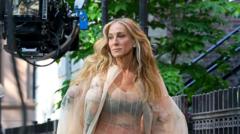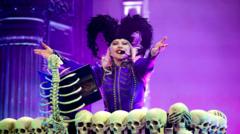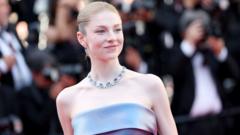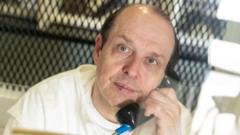In a candid interview, Bella Ramsey discusses the complexities of portraying Ellie in The Last of Us, her experiences with autism, and the representation of LGBTQ+ relationships, all while navigating her own growth as a young actor.
**Bella Ramsey on Navigating Fame, Autism, and the Evolving Character of Ellie in The Last of Us Season 2**
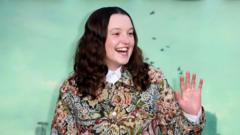
**Bella Ramsey on Navigating Fame, Autism, and the Evolving Character of Ellie in The Last of Us Season 2**
Bella Ramsey reflects on her journey growing up in the spotlight, her character's evolving relationship with Joel, and her autism diagnosis as she embarks on a new season of The Last of Us.
The anticipation for season two of The Last of Us is palpable, especially with Bella Ramsey returning to her iconic role as Ellie, a character that has become a beacon of hope amidst a post-apocalyptic world. Since bursting onto the scene at 13 with Game of Thrones, Bella is now 21 and has shared insights into her life as a young actress tackling significant life experiences while portraying a character beloved by fans.
In an interview following the series' premiere, Bella expressed the uniqueness of her experience growing up under the public eye and the emotional complexity of her character's journey. The show's narrative captivates audiences not only with its thrilling post-apocalyptic plot but also through its exploration of the relationships and ethical dilemmas faced by its characters.
Ellie finds herself at a pivotal age in season two, grappling with the repercussions following the explosive first season finale, which left viewers questioning the bond she shares with Joel (portrayed by Pedro Pascal). As fans can expect, season two dives deeper into the fractures in their relationship due to the choices Joel made, which echoes Bella's reflections on her own familial connections and her decision to diverge from the typical teenage experience.
Bella's openness about being neurodivergent enhances her portrayal of Ellie, as she articulates a desire to de-stigmatize autism and create a more inclusive narrative within the film and television industry. In articulating her journey, Bella hopes to spark inspiration in others, emphasizing that success in the entertainment realm can coexist with neurodiversity.
As the second season unfolds, audiences will also witness the deepening of Ellie's relationship with Dina, portrayed by Isabella Merced, marking a significant representation of queer relationships in mainstream media. Bella advocates for authentic portrayals of LGBTQ+ narratives, asserting that such stories should seamlessly integrate within the overarching narratives rather than being used merely to check representation boxes.
With a third season already confirmed, Ramsey recognizes both the gifts and challenges that come with her public growth, articulating gratitude for her journey encapsulated within her performances. Despite the pressure and complexity of growing up in front of an audience, Bella remains committed to her craft, embracing the uncertainties of her age and the character she plays.
The excitement surrounding The Last of Us continues to build, especially with its premiere on Sky and NOW streaming service set for April 14. As viewers prepare for more twists and turns, Bella's journey as an actress and her evolving identity enrich the storytelling, allowing for a deeper connection to a beloved character.
In an interview following the series' premiere, Bella expressed the uniqueness of her experience growing up under the public eye and the emotional complexity of her character's journey. The show's narrative captivates audiences not only with its thrilling post-apocalyptic plot but also through its exploration of the relationships and ethical dilemmas faced by its characters.
Ellie finds herself at a pivotal age in season two, grappling with the repercussions following the explosive first season finale, which left viewers questioning the bond she shares with Joel (portrayed by Pedro Pascal). As fans can expect, season two dives deeper into the fractures in their relationship due to the choices Joel made, which echoes Bella's reflections on her own familial connections and her decision to diverge from the typical teenage experience.
Bella's openness about being neurodivergent enhances her portrayal of Ellie, as she articulates a desire to de-stigmatize autism and create a more inclusive narrative within the film and television industry. In articulating her journey, Bella hopes to spark inspiration in others, emphasizing that success in the entertainment realm can coexist with neurodiversity.
As the second season unfolds, audiences will also witness the deepening of Ellie's relationship with Dina, portrayed by Isabella Merced, marking a significant representation of queer relationships in mainstream media. Bella advocates for authentic portrayals of LGBTQ+ narratives, asserting that such stories should seamlessly integrate within the overarching narratives rather than being used merely to check representation boxes.
With a third season already confirmed, Ramsey recognizes both the gifts and challenges that come with her public growth, articulating gratitude for her journey encapsulated within her performances. Despite the pressure and complexity of growing up in front of an audience, Bella remains committed to her craft, embracing the uncertainties of her age and the character she plays.
The excitement surrounding The Last of Us continues to build, especially with its premiere on Sky and NOW streaming service set for April 14. As viewers prepare for more twists and turns, Bella's journey as an actress and her evolving identity enrich the storytelling, allowing for a deeper connection to a beloved character.

